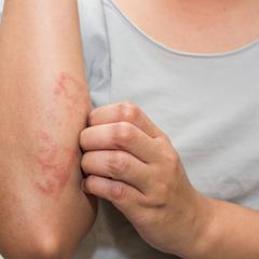The food and ingredients we eat daily can have an impact on our overall health and well-being. It has been shown that dietary factors can trigger responses in the body and also lead to skin reactions.
Numerous studies have been performed to investigate the link between diet and skin issues. One particular study, published in The Journal of Clinical and Aesthetic Dermatology, has established that for some patients with dermatitis, specific foods can indeed lead to an exacerbation. It also states that specific foods can actually cause systemic contact dermatitis in some cases.
I have found that many of my clients with chronic eczema, psoriasis, itchy skin, rosacea or acne have improved after taking a closer look at what they are eating.

What foods can cause skin problems?
Dairy and sugar are two foods that I find can often exacerbate skin conditions like acne, rosacea and eczema. However, any food can irritate and create inflammation if it doesn’t agree with you.
How do you know if you have a Food Intolerance?
If you have a chronic skin condition like acne or eczema, and are unable to get it under control, I recommend getting a food Intolerance test as your diet could be triggering your flare-ups.
How do I control my chronic rosacea, acne or eczema?
The best way to control a chronic skin condition, in my opinion, is with a combination-therapy approach:
-
- A Skin Consultation with a skin specialist (to learn about triggers, products etc)
- A good Daily Skin Routine using appropriate skin products
- Skin Treatments
- Diet & Lifestyle
So, my recommendation, is to start with a skin consult, skin products and treatments if necessary. If skin symptoms are still persisting, despite steps 1 to 3, then it may be a good idea to take a look at your diet and consider a food intolerance test. A Food Intolerance test will tell you if something you are eating is irritating the body and creating inflammation in the skin.

What are the most common symptoms of a Food Intolerance?
A food intolerance can affect people in different ways. People can get a range of body symptoms such as migraine, headaches, muscle aches, digestion issues or fatigue. Some get skin issues such as eczema, acne, itchy skin, inflamed skin, rashes or rosacea.
How can I test for Food Intolerance?
I offer a laboratory-standard Food Intolerance blood test in Oranmore at Maria’s Beauty Haven. It is a simple finger-prick blood test to find out what foods you may be intolerant to. I have seen good results with psoriasis, acne, eczema, rosacea, rashes and itchiness.
Identifying and eliminating specific foods from your diet can be an important step forward to improving your skin.
Maria x
